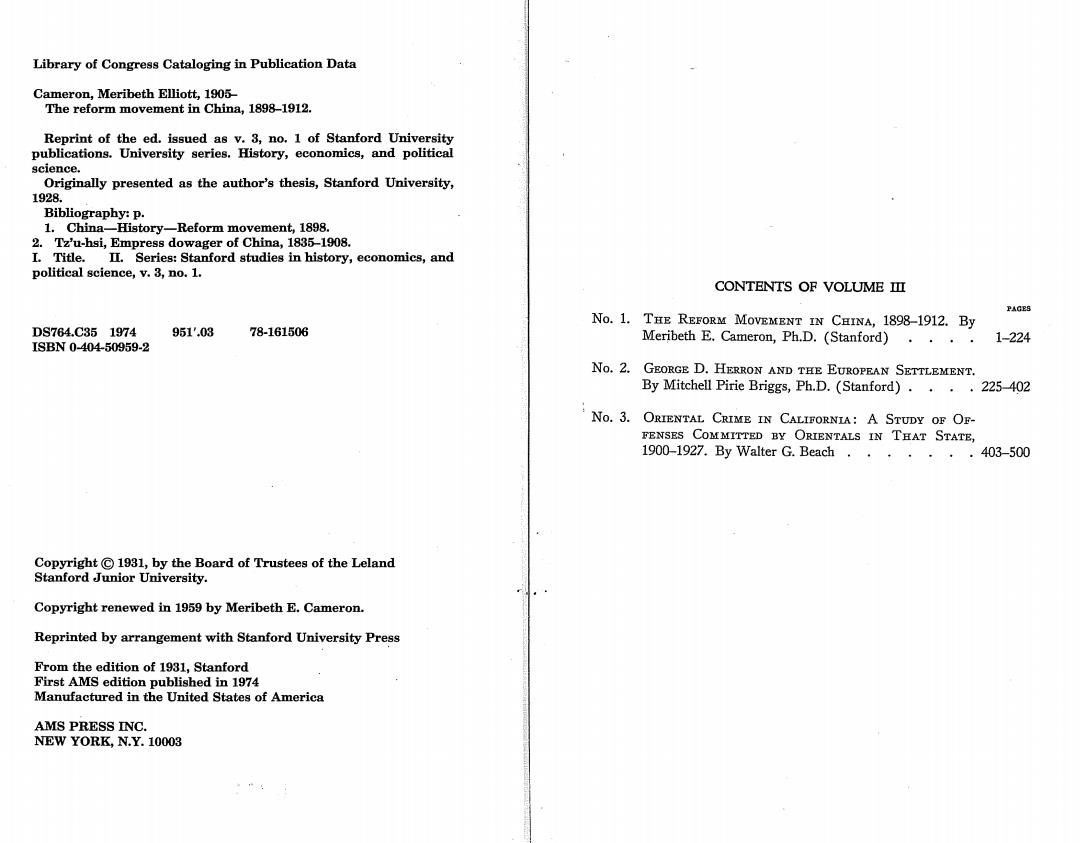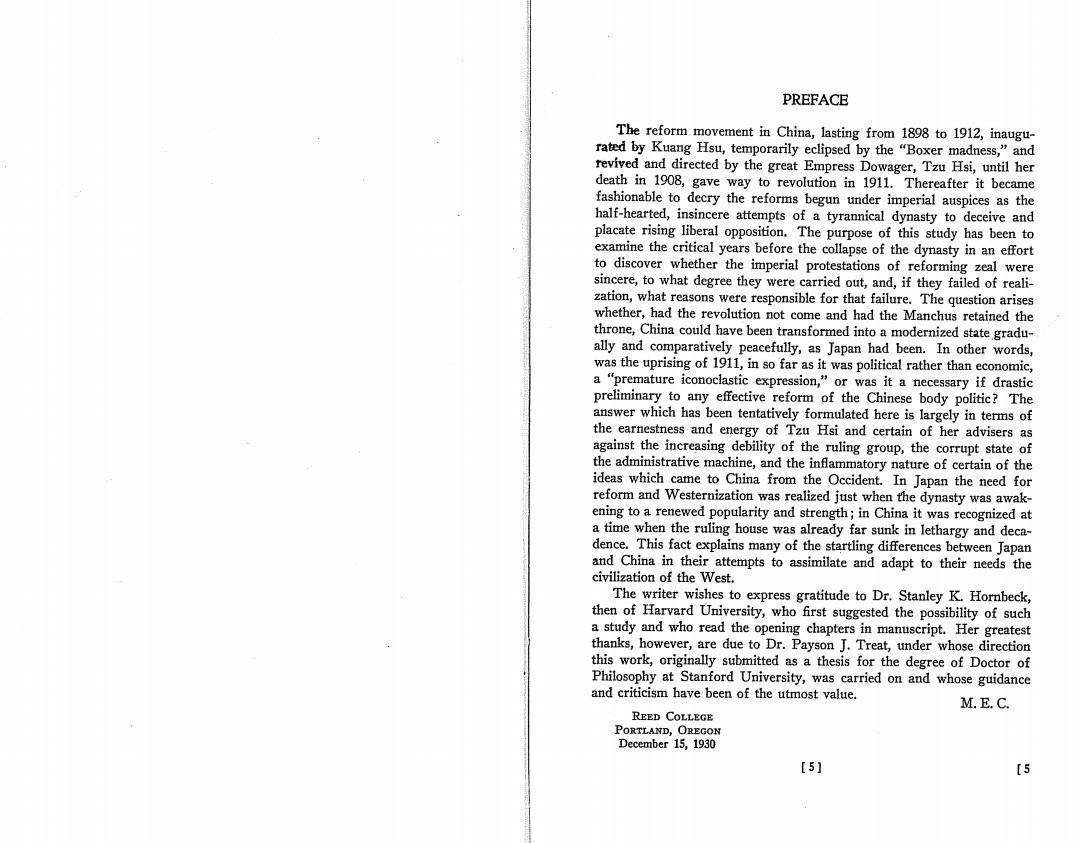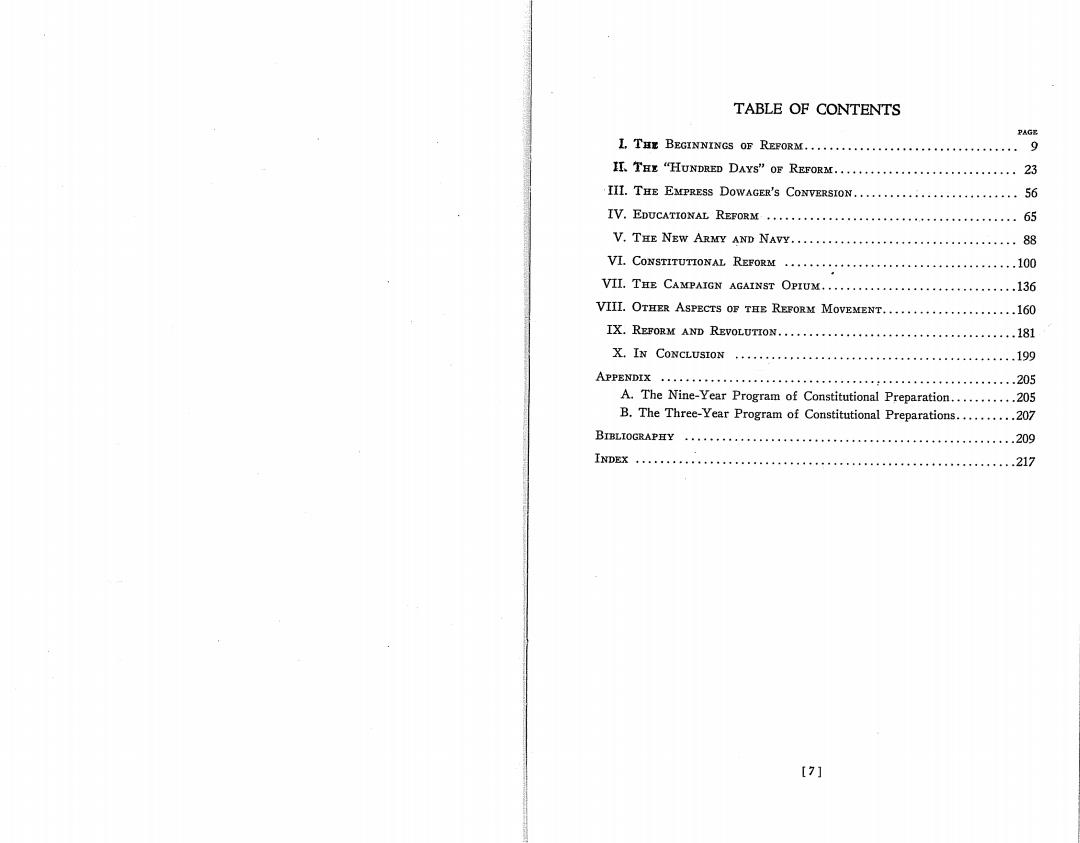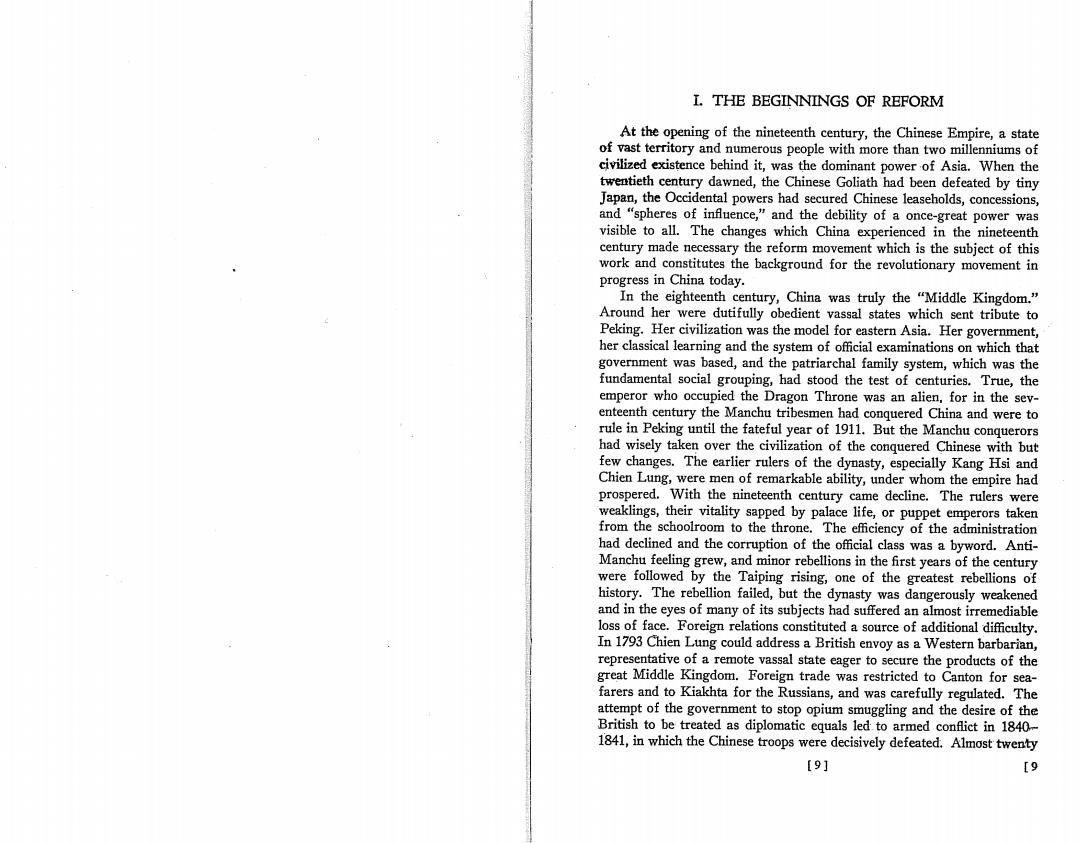
STANFORD UNIVERSITY PUBLICATIONS UNIVERSITY SERIES HISTORY,ECONOMICS,AND POLITICAL SCIENCE VOLUME III NUMBER 1 The Reform Movement in China r898-9r2 By MERIBETH E.CAMERON,PH.D. . 、 民至義 部 中央麻究院 STANFORD UNIVERSITY PRESS STANFORD UNIVERSITY,CALIFORNIA LONDON:HUMPHREY MILFORD OXFORD UNIVERSITY PRESS 1931 中研院人社中心园需配 000410 MMA 30560400110430

Library of Congress Cataloging in Publication Data Cameron,Meribeth Elliott,1905- The reform movement in China,1898-1912. Reprint of the ed.issued as v.3,no.I of Stanford University publications.University series.History,economics,and political science. Originally presented as the author's thesis,Stanford University, 1928. Bibliography:p. 1.China-History-Reform movement,1898. 2.Tz'u-hsi,Empress dowager of China,1835-1908. I.Title.II.Series:Stanford studies in history,economics,and political science,v.3,no.1. CONTENTS OF VOLUME DⅢ PAGES No.1.THE REFORM MOVEMENT IN CHINA,1898-1912.By DS764.C351974 951'.03 78-161506 Meribeth E.Cameron,PhD.(Stanford)···· 1-224 ISBN0-40450959-2 No.2.GEORGE D.HERRON AND THE EUROPEAN SETTLEMENT. By Mitchell Pirie Briggs,Ph.D.(Stanford).... 225-402 No.3.ORIENTAL CRIME IN CALIFORNIA:A STUDY OF OF- FENSES COMMITTED BY ORIENTALS IN THAT STATE, 1900-1927.By Walter G.Beach··,·..·403-500 Copyright C1931,by the Board of Trustees of the Leland Stanford Junior University. Copyright renewed in 1959 by Meribeth E.Cameron. Reprinted by arrangement with Stanford University Press From the edition of 1931,Stanford First AMS edition published in 1974 Manufactured in the United States of America AMS PRESS INC. NEW YORK,N.Y.10003

PREFACE The reform movement in China,lasting from 1898 to 1912,inaugu- rated by Kuang Hsu,temporarily eclipsed by the "Boxer madness,"and revived and directed by the great Empress Dowager,Tzu Hsi,until her death in 1908,gave way to revolution in 1911.Thereafter it became fashionable to decry the reforms begun under imperial auspices as the half-hearted,insincere attempts of a tyrannical dynasty to deceive and placate rising liberal opposition.The purpose of this study has been to examine the critical years before the collapse of the dynasty in an effort to discover whether the imperial protestations of reforming zeal were sincere,to what degree they were carried out,and,if they failed of reali- zation,what reasons were responsible for that failure.The question arises whether,had the revolution not come and had the Manchus retained the throne,China could have been transformed into a modernized state gradu- ally and comparatively peacefully,as Japan had been.In other words, was the uprising of 1911,in so far as it was political rather than economic, a "premature iconoclastic expression,"or was it a necessary if drastic preliminary to any effective reform of the Chinese body politic?The answer which has been tentatively formulated here is largely in terms of the earnestness and energy of Tzu Hsi and certain of her advisers as against the increasing debility of the ruling group,the corrupt state of the administrative machine,and the inflammatory nature of certain of the ideas which came to China from the Occident.In Japan the need for reform and Westernization was realized just when the dynasty was awak- ening to a renewed popularity and strength;in China it was recognized at a time when the ruling house was already far sunk in lethargy and deca- dence.This fact explains many of the startling differences between Japan and China in their attempts to assimilate and adapt to their needs the civilization of the West. The writer wishes to express gratitude to Dr.Stanley K.Hornbeck, then of Harvard University,who first suggested the possibility of such a study and who read the opening chapters in manuscript.Her greatest thanks,however,are due to Dr.Payson J.Treat,under whose direction this work,originally submitted as a thesis for the degree of Doctor of Philosophy at Stanford University,was carried on and whose guidance and criticism have been of the utmost value. M.E.C. REED COLLEGE PORTLAND,OREGON December 15,1930 [5] [5

TABLE OF CONTENTS PAGE I Tag BEGINNINGS oF RggoRM................................9 红HE"HUNDRED DAYS'”OF REFOR.,· 23 III.THE EMPRESS DowAGER's CoNvERSION........................... 56 IV.EpUcATroNAL REPoRM..............................65 V.THE NEW ARmg AND NAvY..................................... 88 VI.CoNsrIrUroNAL RgFoRM......................................100 VIL.THE CAMPAIGN AGAINST OprUM.............136 VIIL.OTEER ASPECTs OF THE REFORM MovEMENT......................160 IX.RgFoRM AND RgvoLUrron.......................................181 X.IN ............................................199 APPENDIX.......................................................205 A.The Nine-Year Program of Constitutional Preparation...........205 B.The Three-Year Program of Constitutional Preparations..........207 .......................................................209 INDEx........................................................217 [7]

I.THE BEGINNINGS OF REFORM At the opening of the nineteenth century,the Chinese Empire,a state of vast territory and numerous people with more than two millenniums of civilized existence behind it,was the dominant power of Asia.When the twentieth century dawned,the Chinese Goliath had been defeated by tiny Japan,the Occidental powers had secured Chinese leaseholds,concessions, and "spheres of influence,"and the debility of a once-great power was visible to all.The changes which China experienced in the nineteenth century made necessary the reform movement which is the subject of this work and constitutes the background for the revolutionary movement in progress in China today. In the eighteenth century,China was truly the "Middle Kingdom." Around her were dutifully obedient vassal states which sent tribute to Peking.Her civilization was the model for eastern Asia.Her government, her classical learning and the system of official examinations on which that government was based,and the patriarchal family system,which was the fundamental social grouping,had stood the test of centuries.True,the emperor who occupied the Dragon Throne was an alien.for in the sev- enteenth century the Manchu tribesmen had conquered China and were to rule in Peking until the fateful year of 1911.But the Manchu conquerors had wisely taken over the civilization of the conquered Chinese with but few changes.The earlier rulers of the dynasty,especially Kang Hsi and Chien Lung,were men of remarkable ability,under whom the empire had prospered.With the nineteenth century came decline.The rulers were weaklings,their vitality sapped by palace life,or puppet emperors taken from the schoolroom to the throne.The efficiency of the administration had declined and the corruption of the official class was a byword.Anti- Manchu feeling grew,and minor rebellions in the first years of the century were followed by the Taiping rising,one of the greatest rebellions of history.The rebellion failed,but the dynasty was dangerously weakened and in the eyes of many of its subjects had suffered an almost irremediable loss of face.Foreign relations constituted a source of additional difficulty. In 1793 Chien Lung could address a British envoy as a Western barbarian, representative of a remote vassal state eager to secure the products of the great Middle Kingdom.Foreign trade was restricted to Canton for sea- farers and to Kiakhta for the Russians,and was carefully regulated.The attempt of the government to stop opium smuggling and the desire of the British to be treated as diplomatic equals led to armed confict in 1840- 1841,in which the Chinese troops were decisively defeated.Almost twenty [9] [9